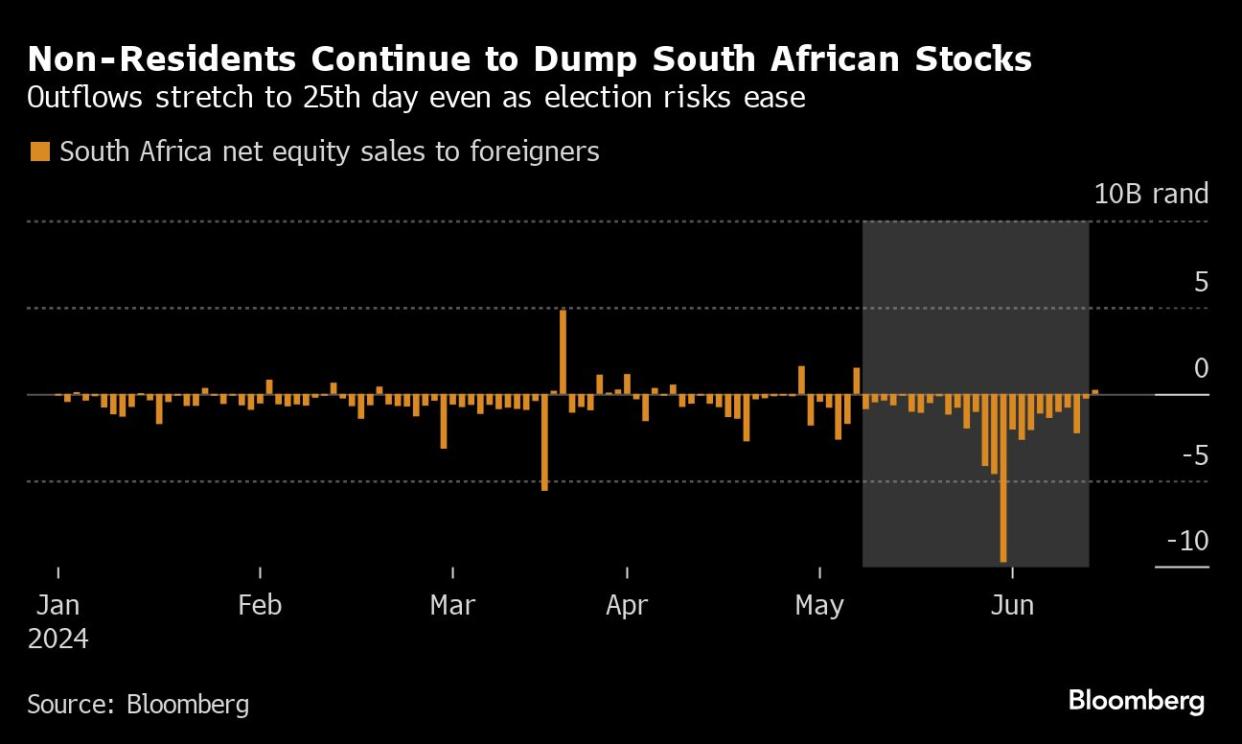South Africa Stock Surge Hints at Sentiment Turn After Vote

(Bloomberg) -- South Africa’s stock benchmark rallied the most this year, suggesting investors are turning positive on the nation’s equities after the longest daily streak of outflows in three years. The rand and government bonds surged.
Most Read from Bloomberg
What to Know About the Deadly Flesh-Eating Bacteria Spreading in Japan
‘I Live in Hell’: Anti-Growth Fervor Grips US South After Pandemic Boom
Nvidia’s 591,078% Rally to Most Valuable Stock Came in Waves
Nvidia Becomes World’s Most Valuable Company as AI Rally Steams Ahead
Tuesday’s gains follow the reelection of Cyril Ramaphosa as president after the African National Congress agreed on a government alliance with the official opposition Democratic Alliance and smaller parties. Shares also played catch-up with the global rally after a public holiday in South Africa on Monday.
Foreign investors were net sellers of South African shares for 25 straight days through Friday, according to JSE Ltd. data. The outflows deepened in the days following the May 29 election, in which the ANC lost its parliamentary majority for the first time since 1994, raising concerns it may partner with one or more populist rivals to stay in power. That pushed the benchmark down almost 4% from a May 20 year-to-date high.
Non-residents sold a net 42.6 billion rand ($2.3 billion) of Johannesburg stocks in the 25-day period, bringing outflows this year to $4.7 billion.
But on Tuesday, the FTSE/JSE Africa All Share index was the best performer among 92 global equity benchmarks tracked by Bloomberg, rallying as much as 3.5% as banks, insurers and retailers surged. Old Mutual Ltd., Clicks Group Ltd., FirstRand Ltd., and Truworths International Ltd. were among the leading gainers.
The country’s so-called government of national unity has buoyed sentiment with a pledge to speed up reform measures, including reining in state debt and tackling the power shortages and logistics snarl-ups that have hobbled Africa’s biggest economy. The exclusion of parties that support land expropriation and the nationalization of mines and banks helped shore up investor sentiment.
“This is the best-case scenario for South African politics — the DA’s active participation in a GNU — and South African stocks should rally further,” JPMorgan Securities plc David Aserkoff and Inga Galeni wrote in a note Tuesday in which they raised the country to overweight from underweight in their asset allocation for Central and Eastern Europe, Middle East and Africa.
Given the long run of foreign outflows from South Africa and the “big all-time low in the country’s institutional funds’ holding of domestic equities, we could see big flows into equities near term,” they wrote, adding that the upgrade is a short-term call.
Sign up here for the twice-weekly Next Africa newsletter
S&P Global Ratings said the new government’s agenda “aims to prioritize structural reforms to address basic infrastructure and service delivery shortfalls and weak investments, while gradually narrowing fiscal deficits.
“The election outcome is broadly favorable for the economic and fiscal outlook, compared with the alternatives,” it said in a statement.
The rand gained 1% to 18.0805 per dollar as of 2:44 p.m. in Johannesburg, wiping out its post-election losses. Yields on benchmark 2035 government bonds plunged 26 basis points to 11.46%, the lowest on a closing basis since Feb. 2.
You can follow Bloomberg’s reporting on Africa on WhatsApp. Sign up here.
--With assistance from Ana Monteiro, Robert Brand and Henry Ren.
(Updates with JPMorgan commentary in seventh paragraph.)
Most Read from Bloomberg Businessweek
Coke—and Dozens of Others—Pledged to Quit Russia. They’re Still There
Google DeepMind Shifts From Research Lab to AI Product Factory
©2024 Bloomberg L.P.


